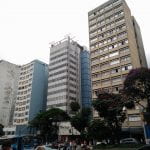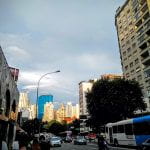Brazil Here I Am!
Parting with India, I finally landed in São Paulo, Brazil for the next chapter of my study abroad journey. “Overwhelmed” would be the best word to capture my condition over the last 5 days, since it feels like I am stepping into a world opposite to Ahmedabad: If my first days in Ahmedabad were wrapped up in dry and burning heat, dirt-packed air and (excitingly) chaotic traffic of motorbikes, rickshaws, cars, buses, cows and dogs, São Paulo paved my first steps in Brazil with humid and rainy days of monsoon season, clean air filtered by lines of trees in almost every corner of hilly streets, colorful graffiti-filled walls and orderly flow of pedestrians, cars, bikers and buses. For a moment I thought I was walking on a street in San Francisco! Indeed, the central area of São Paulo where we were arranged to reside and go to school feels a lot like an urban space in the States (Comparisons drawn so far by my American friends in the program include New York, Boston, New Orleans and San Francisco).
Unlike the horizontal sprawling of Ahmedabad, the center of São Paulo is exploding vertically with skyscrapers and high residential buildings, busy business and commercial districts lying side by side with buzzing corners of restaurants, bars and discos. On one hand, this reflects the fast growth of São Paulo as a mega-city of the world, together with the appealing living standards it promises. On the other hand, the reality of a middle-class space and lifestyle I have been exposed to so far veils as much as it reveals about urbanization in Brazil. Through readings we were reminded that for this prosperous center to exist, many poor, working class people have been pushed to the periphery of the city in slum-like areas called “favelas”. In Ahmedabad, a random walk on a busy street could instantly bring slum dwelling into sight, making traces of poverty still clear and vivid to every urban resident’s mind on a daily basis. Meanwhile, in São Paulo, the unfavorable living conditions of low income families have been cleared “out of sight, out of mind” from the city center and consequently, from its middle- and high-class urban residents. As a result, although I am enjoying the new breath of fresh air and green streets São Paulo has offered so far, sometimes I can’t help feeling as if I was walking in a box of privilege, well shielded from the social inequality that rises hand in hand with the explosive wealth of the emerging Brazilian economy. I am intrigued to see how the program helps me unpack a more thorough picture of urbanization in São Paulo through lectures from community leaders/ social activists and site visits to more disadvantaged communities in the city.
Back to a more personal aspect of the program – homestay – my new host family is also a stark contrast to the one I stayed with in Ahmedabad. While in India I was surrounded by a strong familial atmosphere of a 4-member household, my new homestay in Brazil only has one host mom. An independent women in her 60s, my new host mom lives on her own in a two-bedroom apartment, enjoying singing in a jazz lady group and making wedding cards as her full-time job. She has two children, both of whom have settled down with their own families in other parts of São Paulo. My homestay space, therefore, only has me, another friend of the program and my host mom. My host mom is pretty busy throughout the day, so we have had quick conversations in the morning and after dinner in late evening to get to know each other more, but none of the long-hour bonding time I once had with my host brother, sister and mother during tea time in India. I felt less “pampered” and a stronger sense of personal freedom in this new homestay. At the same time, I found myself frequently reminiscing about the close-knit familial ties I shared with my host family in India as well as the urge to come home after class. In São Paulo the feeling of a “home” has not sunk in much yet.
Another interesting insight lies in the level of openness in each homestay: In India privacy is the key in the family, and it takes me a while to get to know more about my host family members (Once the connection is built, it stays so dearly that I still keep in frequent contact with my host brother and sister till now). In contrast, my Brazilian host mom was ready to share about her marriage life right on our first day in the house! Just as our program coordinator in Brazil shared with us on our arrival: “People here are willing to tell you their whole life after 10 minutes of meeting!” Coming from an Asian background, I will need some time to adjust to this change of culture from strict privacy and intimacy to quick and easy-going openness. Yet the difference only makes me more grateful of the various experiences I am lucky to have in this program, and I am excited for the memories we will build in Brazil with our host mom!
 (My host mom with her home-made amazing chocolate cake as a gift for us on our first day at home!)
(My host mom with her home-made amazing chocolate cake as a gift for us on our first day at home!)
Overall, São Paulo promises to offer extreme differences from the way of life I just started to get used to in Ahmedabad, so I will have to stretch my adaptation mechanism to the max again. This drastic change reflects one of the most exciting, yet challenging part of IHP program: We have the chance to compact the diversity of three distinct cultures and form interesting comparative perspectives. At the same time we found ourselves constantly on the move, so much that the moment we were beginning to find our space and comfort in a city we would move on to the next with completely separate rhythm and pace of life. This reality makes me reflect on what a traveling life (or more poetically, a wandering spirit) that I have always envisioned for myself after Amherst entails, and what mindset I need to prepare myself with to take on that challenge.



Oi Tran! I hope you are enjoying Brazil 🙂